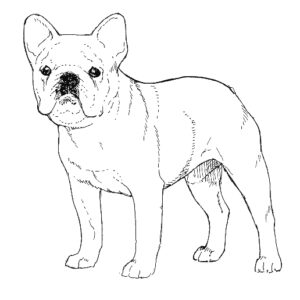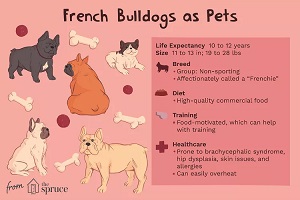The French Bulldog, often affectionately called "Frenchie," is a small, muscular, and charming breed known for its distinctive bat-like ears, expressive eyes, and friendly nature. Despite their adorable appearance, French Bulldogs require specific care to maintain their health and well-being.
What is the History of the French Bulldog?
Origins in England:
The French Bulldog's roots can be traced back to the early 19th century in England. They are descendants of a small-sized Bulldog breed, which was popular among lace workers in the English Midlands. These lace workers migrated to France during the Industrial Revolution, bringing their beloved Bulldogs with them.
French Bulldog Rise in Popularity in France:
In France, the Bulldogs quickly captured the hearts of the Parisian society, particularly the artists, writers, and fashionistas. They were adored for their charming personalities, compact size, and unique appearance. The breed's popularity soared, and they became a fashionable accessory among the French upper class and bohemian circles.
Selective French Bulldog Breeding in France:
French breeders further refined the breed's characteristics, including their distinctive bat-like ears, compact size, and affectionate nature. They crossed the Bulldogs with local terrier breeds and Pugs to develop the Frenchie we know today. The result was a smaller, more compact Bulldog with a friendly and adaptable temperament.
French Bulldog Exportation to the United States:
As the French Bulldog gained popularity in France, the breed started to catch the attention of dog enthusiasts in other countries. In the late 19th century, American tourists visiting France fell in love with the breed and began importing French Bulldogs back to the United States. The Frenchie's popularity quickly spread across North America.
French Bulldog Recognition and Breed Standard:
In 1898, the French Bulldog Club of America (FBCA) was established, becoming the first official breed club dedicated to French Bulldogs. The FBCA worked to promote and preserve the breed, develop breed standards, and organize dog shows. In 1898, the breed was officially recognized by the American Kennel Club (AKC).
Continued Popularity:
Over the years, the French Bulldog's popularity has remained strong, making it one of the most popular dog breeds in several countries, including the United States, the United Kingdom, and Australia. Their charming personality, compact size, and adaptability have made them beloved companions and family pets.
Modern French Bulldog:
The modern French Bulldog maintains the distinctive features that were developed in France. They have a sturdy and muscular build, a compact body, and a short, smooth coat. Frenchies are known for their large, expressive eyes, bat-like ears, and a delightful range of coat colors, including brindle, fawn, and pied patterns.
In recent years, efforts have been made to promote responsible breeding practices to ensure the health and well-being of the breed. As brachycephalic dogs, French Bulldogs may be prone to certain health issues, such as respiratory problems and overheating. Responsible breeders focus on breeding for improved health and temperament while adhering to breed standards.
The history of the French Bulldog is a testament to the breed's enduring charm and appeal. From their humble beginnings in England to their rise in popularity in France and worldwide, French Bulldogs have won the hearts of many with their unique appearance, delightful personality, and unwavering loyalty.
Do French Bulldogs Have Health Issues?
French Bulldogs, like many purebred dogs, are susceptible to certain health conditions. Responsible breeding practices and proactive care can help minimize the risk of these conditions. Here are some important health considerations for French Bulldogs:
- Brachycephalic Syndrome: French Bulldogs have a flat and short skull, which can lead to brachycephalic syndrome. This condition can cause breathing difficulties, heat sensitivity, snoring, and exercise intolerance. It is crucial to avoid exposing French Bulldogs to excessive heat and ensure they have access to cool and well-ventilated areas.
- Respiratory Issues: Due to their shortened muzzle, French Bulldogs are prone to respiratory issues. They may experience difficulty breathing, snorting, and wheezing. It's important to monitor their breathing during exercise and avoid overexertion.
- Allergies: French Bulldogs can be prone to allergies, which can manifest as skin irritations, itchiness, and gastrointestinal issues. Identifying and avoiding allergens, such as certain foods or environmental triggers, can help manage allergies. Consultation with a veterinarian and potential allergy testing may be necessary for proper diagnosis and treatment.
- Eye Problems: French Bulldogs are predisposed to various eye conditions, including cherry eye, dry eye, and corneal ulcers. Regular eye examinations by a veterinarian are essential to detect and address any eye issues promptly.
- Hip Dysplasia: Although not as prevalent as in larger breeds, French Bulldogs can still develop hip dysplasia. Responsible breeding practices, such as hip evaluations of breeding stock, can help minimize the risk. Maintaining a healthy weight and providing low-impact exercise is also important for joint health.
- Dental Care: French Bulldogs are prone to dental problems, such as periodontal disease and tooth decay. Hard chews like Deer or Elk Antlers and synthetic ones like Duralast Nylabones or Benebones will help prevent tatar buildup. Regular tooth brushing, dental chews, and professional cleanings can help maintain good oral hygiene.
What is the Temperament of a French Bulldog?
The temperament of the French Bulldog is often described as affectionate, friendly, and adaptable. They are known for their loving nature and desire to be in close contact with their human companions. Here are some key characteristics of the French Bulldog's temperament:
- Affectionate: French Bulldogs are extremely affectionate and thrive on human companionship. They form strong bonds with their owners and enjoy being involved in all aspects of their lives. Frenchies are often described as "lap dogs" and love nothing more than cuddling up with their favorite people.
- Sociable: French Bulldogs generally get along well with other animals and are typically friendly toward strangers. They have a naturally sociable nature and enjoy meeting new people and dogs. Proper socialization from a young age is important to ensure they develop good manners and positive interactions with others.
- Playful: Despite their small size, French Bulldogs have a playful and energetic side. They enjoy interactive playtime and are often up for a game of fetch or tug-of-war. Frenchies have a great sense of humor and can provide endless entertainment with their playful antics.
- Easygoing: French Bulldogs have a laid-back and easygoing temperament, which makes them well-suited for various living situations, including apartments or urban environments. They adapt well to different lifestyles and are generally not overly demanding or high-maintenance.
- Alert: While French Bulldogs may not be known for their guarding instincts, they are alert and will often bark to alert their owners of any potential intruders or unfamiliar noises. However, they are not aggressive and are more likely to greet strangers with enthusiasm rather than suspicion.
- Stubborn: French Bulldogs can exhibit a stubborn streak at times, which can make training a bit challenging. They have an independent nature and may require consistent and patient training methods that utilize positive reinforcement. Short, engaging training sessions with plenty of rewards tend to be most effective with Frenchies.
- Sensitivity: French Bulldogs are sensitive dogs and can be responsive to their owners' emotions. They are intuitive and can often sense when their human companions are feeling down or upset. Their affectionate and empathetic nature can be comforting during difficult times.
- Low Energy Levels: While French Bulldogs enjoy playtime and daily walks, they are generally not excessively active dogs. They have moderate exercise needs and can be prone to overheating due to their brachycephalic (short-faced) structure. It's important to monitor their activity level, especially in hot weather, to prevent overheating or respiratory issues.
It's worth noting that individual French Bulldogs may vary in temperament, and early socialization and training play a crucial role in shaping their behavior. Positive reinforcement training methods, along with patience, consistency, and plenty of love and attention, can help bring out the best in their temperament and ensure they grow into well-rounded and happy companions.
Overall, the French Bulldog's temperament is a delightful mix of affection, playfulness, and adaptability, making them a popular choice for individuals and families seeking a loving and loyal companion.
What is the Best Way to Train French Bulldogs?
French Bulldogs are intelligent and eager to please, making them relatively easy to train. However, they can be stubborn at times. Consistency, positive reinforcement, and patience are key when training a French Bulldog. Here are some training tips for Frenchies:
- Start Early: Begin training your French Bulldog as early as possible. Puppyhood is a critical period for socialization and basic obedience training. Focus on teaching commands like sit, stay, come, and walking on a leash.
- Positive Reinforcement: Use positive reinforcement techniques, utilizing praise as the rewards, to motivate and reinforce good behavior. French Bulldogs respond well to rewards-based training and may become disinterested or uncooperative if faced with harsh training methods.
- Socialization: Expose your French Bulldog to various people, animals, and environments from a young age. Proper socialization helps them develop into well-rounded and confident adults. Arrange controlled playdates with other dogs to foster positive interactions.
- Housetraining: French Bulldogs can be challenging to housetrain due to their stubbornness and small bladder capacity. Establish a consistent routine, use positive reinforcement, and be patient during the housetraining process. Crate training can be a helpful tool.
- Basic Manners: Teach your French Bulldog basic manners, such as not jumping on people or excessive barking. Consistency and positive reinforcement are crucial to instill good manners and prevent unwanted behaviors.
- Mental Stimulation: Engage your French Bulldog in mental stimulation activities, such as puzzle toys or obedience training. Mental exercises keep their minds sharp and prevent boredom.
- Item Discernment: Set up exercises where you give your dog the choice to play with their toys and a selection of items they should not have. If they choose their toys, praise and engage in play with them to encourage this behavior. If they choose poorly, step in and correct them.
How Much Grooming Do French Bulldogs Require?
French Bulldogs have a short and smooth coat that requires regular grooming to maintain their health and appearance. Here are some grooming tips for French Bulldogs:
- Brushing: French Bulldogs have a dense coat that sheds moderately. Regular brushing with a soft-bristle brush or grooming mitt helps remove loose hair and prevents matting.
- Bathing: French Bulldogs should be bathed regularly, but not excessively, to avoid drying out their skin. Use a mild dog shampoo and ensure thorough rinsing. Be cautious not to get water in their ears, as it can lead to ear infections.
- Wrinkle Care: French Bulldogs have adorable facial wrinkles that require attention to prevent skin infections. Clean the wrinkles gently with a damp cloth or specialized wrinkle wipes. Ensure the wrinkles are dry after cleaning to avoid moisture buildup.
- Nail Care: Trim your French Bulldog's nails regularly to prevent them from becoming too long and causing discomfort. If you're unsure or uncomfortable doing it yourself, consult a professional groomer or veterinarian.
- Ear Cleaning: Check and clean your French Bulldog's ears regularly to prevent wax buildup and infections. Use a veterinarian-recommended ear cleaning solution and cotton balls or pads to gently clean the outer part of the ear.
How Much Exercise Does a French Bulldog Need?
Despite their small size, French Bulldogs still require regular exercise to maintain a healthy weight and prevent obesity-related health issues. Here are some exercise considerations for French Bulldogs:
- Daily Walks: Take your French Bulldog for daily walks to provide mental and physical stimulation. However, avoid walking them during the hottest parts of the day to prevent overheating.
- Playtime: Engage in interactive play sessions with your French Bulldog, such as fetch or tug-of-war. This helps burn off excess energy and strengthens the bond between you and your Frenchie.
- Indoor Activities: French Bulldogs are well-suited to indoor living, making them suitable for apartment dwellers. Engage them in indoor activities like playing with interactive toys or using a treadmill specifically designed for dogs.
- Exercise Intensity: Be mindful of the French Bulldog's brachycephalic nature and respiratory sensitivities. Avoid excessive exercise or activities that may cause them to overheat or struggle to breathe.
- Mental Stimulation: In addition to physical exercise, provide mental stimulation through puzzle toys, obedience training, or nose work. Mental exercises are important for keeping your French Bulldog engaged and preventing boredom.
French Bulldog Needs Special Nutrition?
Proper nutrition is essential for the overall health and well-being of your French Bulldog. A well-balanced diet should provide the necessary nutrients while considering the breed's unique characteristics. Here are some nutrition tips for French Bulldogs:
- High-Quality Dog Food: Feed your French Bulldog a high-quality dog food that is appropriate for their life stage (puppy, adult, or senior). Look for dog foods that contain high-quality proteins, moderate fat content, and a balance of essential nutrients.
- Portion Control: French Bulldogs can be prone to obesity, so it's important to monitor their food intake and portion sizes. Follow the feeding guidelines provided by the dog food manufacturer and adjust according to your Frenchie's individual needs, activity level, and weight.
- Avoid Overfeeding: French Bulldogs have a tendency to overeat, so avoid free-feeding or leaving food out all day. Stick to scheduled meal times and avoid giving excessive treats or table scraps.
- Special Dietary Considerations: Some French Bulldogs may have specific dietary needs or sensitivities. If your Frenchie has allergies, digestive issues, or other health conditions, consult with a veterinarian to determine the appropriate diet and potential dietary supplements.
- Fresh Water: Ensure your French Bulldog has access to fresh and clean water at all times. Hydration is crucial for their overall health, especially during hot weather or after exercise.
Conclusion on the French Bulldog
In conclusion, French Bulldogs are truly captivating dogs with a rich history, endearing temperament, and unique physical characteristics. Their journey from the lace workers of England to the fashion-forward circles of France has solidified their place as beloved companions worldwide. Frenchies are known for their affectionate and sociable nature, bringing joy and love to the lives of their owners. While they may have their quirks and health considerations, their loyal and playful personalities make them cherished members of families and individuals alike. Whether curled up on a lap or engaging in playful antics, the French Bulldog's charm is undeniable, earning them a special place in the hearts of dog lovers everywhere.
The article above contains Affiliate Links from Amazon and other companies. If you visit their site and buy the product, we will get a small commission. Please know that we only recommend products we truly love and would never recommend a product we don't think is incredible. We look at and try hundreds of products before we ever recommend them to our clients!













